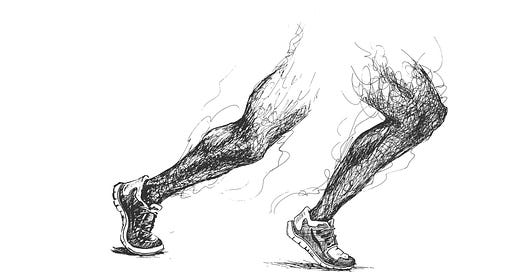You Can't Outrun What Matters
"It is not length of life, but depth of life." – Ralph Waldo Emerson.
We rush from one task to the next, trying to tick off boxes, meet deadlines, and keep up with the relentless pace. Success is often measured by how fast we move, how much we accomplish, and how far ahead we seem compared to others. But in this pursuit, we often lose sight of what truly matters.
The irony is that while we may try to outrun life's more profound questions and essential priorities, they are always waiting for us. Eventually, they catch up.
Consider how much time is spent on the urgent rather than the important. We are constantly bombarded with notifications, emails, and to-do lists that demand immediate attention. But how often do these things matter in the grand scheme of life?
In the rush to answer emails or finish a project, we neglect our relationships, personal growth, or mental well-being. We live for tomorrow, hoping that one day, we will finally have the time to reflect and focus on what we care about most.
Yet, as the days pass, that time never seems to come.
The philosopher Seneca captured this dilemma perfectly when he said, "We suffer more often in imagination than in reality."
Much of our suffering is self-inflicted. We chase the superficial and the fleeting, convinced that they will bring us happiness or fulfilment. In truth, the things that matter—meaningful relationships, personal integrity, and inner peace—cannot be rushed or outrun. They require time, attention, and a willingness to slow down.
Trying to outrun life's deeper realities comes with consequences. We may be able to push away essential thoughts or feelings for a while, but eventually, they manifest in ways that can't be ignored. We might experience burnout, a midlife crisis, or an overwhelming dissatisfaction, even when everything appears successful on the surface. These are signals that we've been neglecting our deeper needs.
Carl Jung, the influential psychologist, believed that the unconscious mind will bring what we refuse to acknowledge to the surface. The longer we avoid our true priorities, the more likely they are to emerge in unproductive or harmful ways. Jung's insight reminds us that our inner life will always demand our attention, no matter how fast we try to move past it.
The antidote to this race is reflection. Regularly pausing to consider what truly matters prevents us from getting lost in the noise of daily life. Reflection forces us to confront difficult questions: Are we living in alignment with our values? Are we dedicating time to the people and activities that enrich our lives? Are we allowing space for rest, creativity, and personal growth?
Philosophers from ancient Greece to modern-day thinkers have emphasised the importance of reflection. Socrates famously declared that "the unexamined life is not worth living." Without taking the time to reflect, we risk living on autopilot, reacting to life rather than intentionally creating it.
The Practical Steps to Focusing on What Matters
Understanding the need to focus on what matters is one thing; putting it into practice is another. Here are some actionable steps to help guide us back to the things that truly matter:
Create space for stillness: Whether meditation, journaling, or simply walking, building in time for reflection is essential. This allows you to reconnect with yourself and gain clarity on your true priorities.
Say no to the unimportant: Much of what fills our time is unnecessary. Learning to say no—both to others and to yourself—is crucial for creating space for what truly matters. As Greg McKeown suggests in his book Essentialism, the key to living a meaningful life is focusing on fewer things but doing them well.
Nurture relationships: Meaningful relationships are often the first to be neglected in the pursuit of productivity. Dedicate time to the people who bring depth and joy into your life, even if it means letting go of certain tasks or goals.
Practice gratitude: Gratitude helps us appreciate what we already have, rather than constantly seeking more. Regularly reflecting on what we are grateful for can ground ourselves in the present and strengthen our connection to what truly matters.
Check in with your values: Are your actions aligned with your values? Regularly reviewing this alignment can help prevent the dissonance of living a life that prioritises what feels urgent over what is significant.
No matter how far or fast we run, life brings us back to what's truly important. We cannot outrun death, nor can we outrun the fundamental questions of existence: Why are we here? What gives our lives meaning? How should we live? These questions may feel uncomfortable, but they define the depth and quality of our lives.
It is better to confront them on our terms, with intention and openness, than to wait for a crisis to force the issue. Viktor Frankl, a Holocaust survivor and psychologist, wrote about the importance of finding meaning in life, even in the face of suffering.
He observed that those who could identify meaning were far more resilient in the face of hardship than those who couldn't. This underscores the point that life's most significant questions are not a burden to be outrun—they are a source of strength.
In the end, we cannot escape what truly matters. The things we run from—our need for meaning, connection, and inner peace—are the very things that define a life well-lived.
The more we try to outrun these realities, the more we distance ourselves from the life we truly want to live. By slowing down, reflecting, and making intentional choices, we can ensure that our lives are fast-paced and deeply fulfilling. Because when we stop running and start paying attention, we realise that everything we need has been right here all along.




